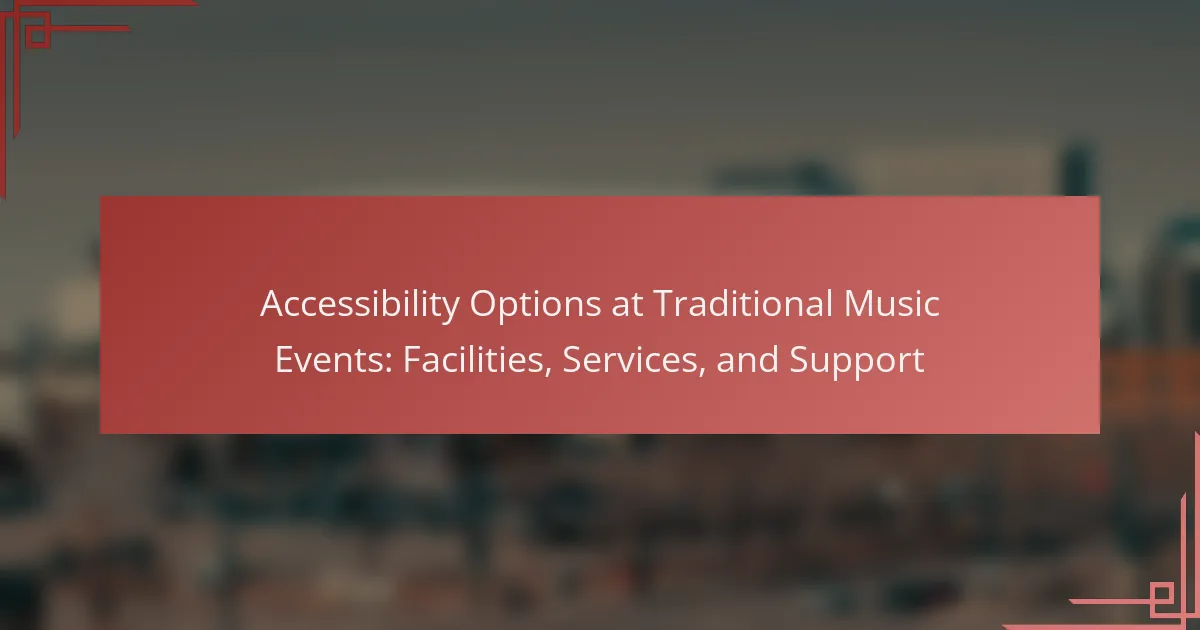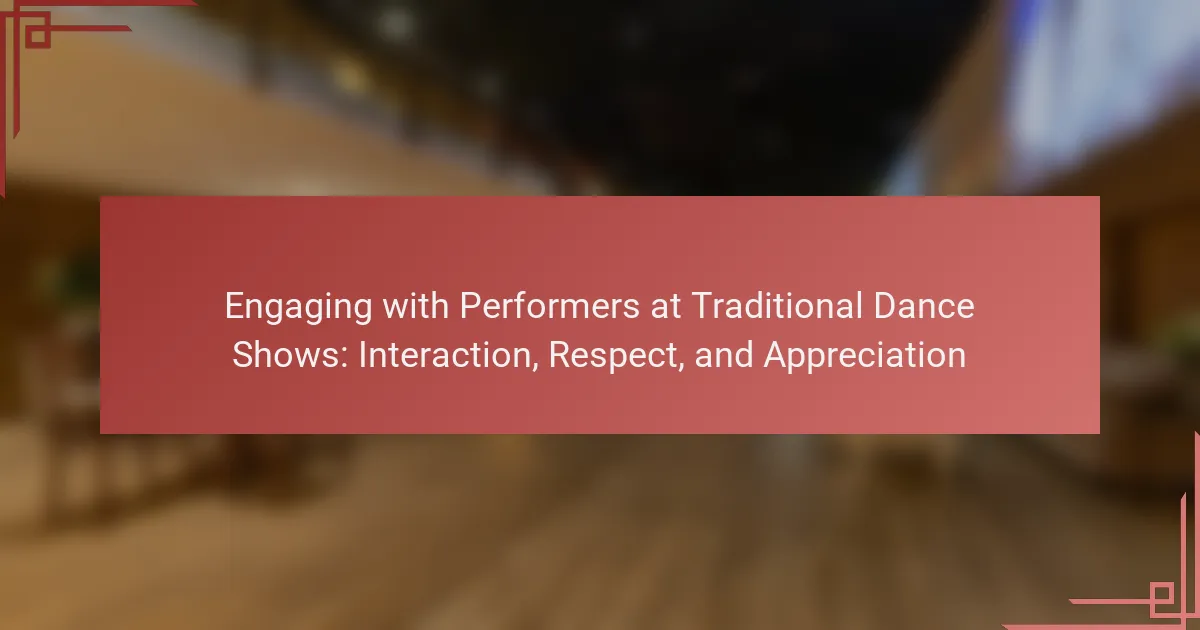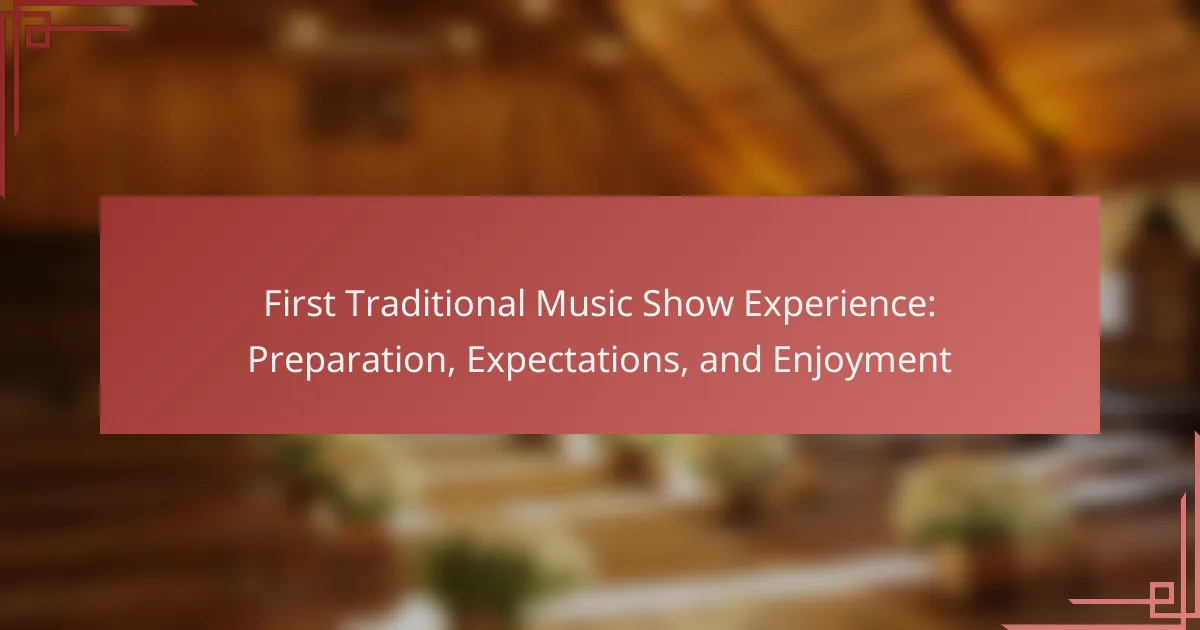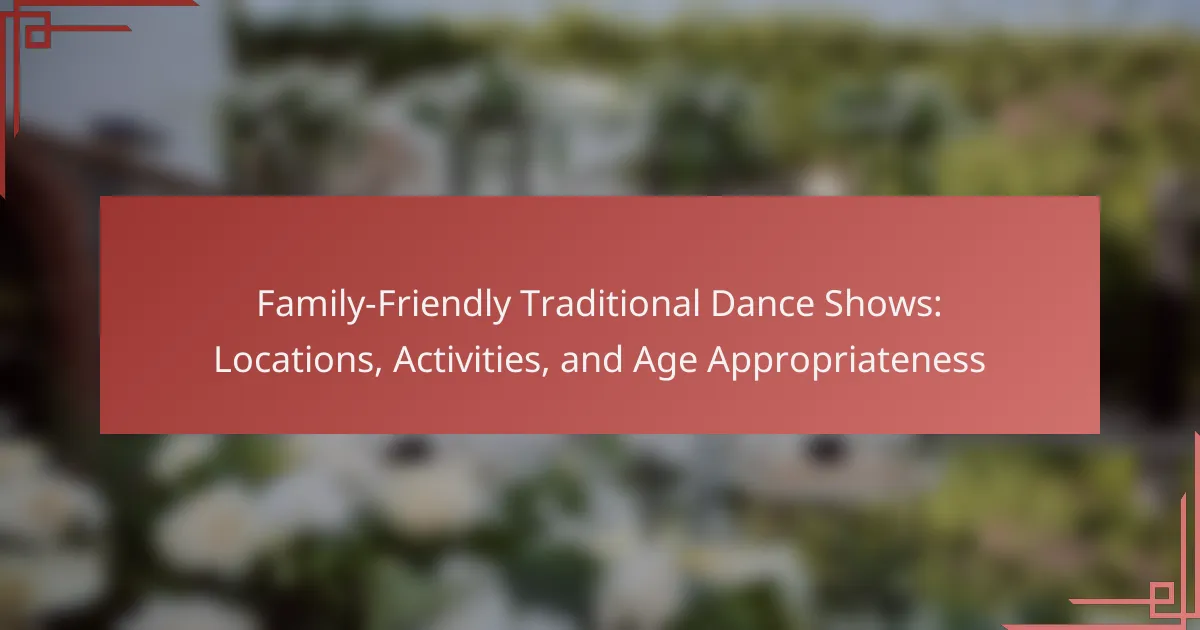Music events in the UK are committed to inclusivity, offering a range of accessibility options to ensure that everyone can enjoy the performances. Facilities such as wheelchair access, accessible seating, and sign language interpretation, along with tailored transportation services, are designed to support individuals with disabilities. These measures not only comply with legal requirements but also enhance the overall experience for all attendees, regardless of their physical limitations.
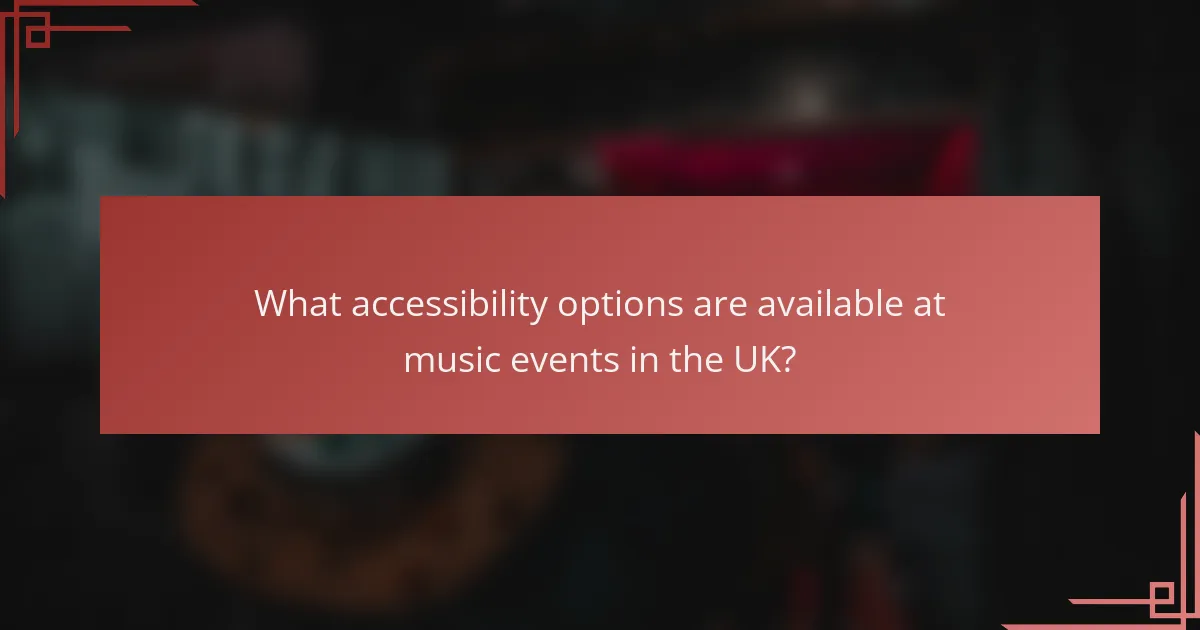
What accessibility options are available at music events in the UK?
Music events in the UK offer various accessibility options to ensure that all attendees can enjoy the experience. These options include wheelchair access, accessible seating, sign language interpretation, accessible restrooms, and transportation services tailored for individuals with disabilities.
Wheelchair access at venues
Most music venues in the UK are required to provide wheelchair access, including ramps, elevators, and designated entry points. It’s advisable to check the venue’s website or contact them directly to confirm the availability of these facilities before attending.
Some venues may also offer designated viewing areas for wheelchair users, ensuring a clear line of sight to the stage. Always arrive early to secure the best spots and avoid any last-minute issues.
Accessible seating arrangements
Accessible seating is typically available at music events, allowing individuals with mobility challenges to sit comfortably. Venues often reserve specific sections for those requiring accessible seating, which can be booked in advance.
When purchasing tickets, look for options labeled as accessible or contact the box office for assistance. It’s essential to communicate any specific needs to ensure a suitable arrangement.
Sign language interpretation services
Many music events in the UK provide sign language interpretation services to accommodate deaf and hard-of-hearing attendees. These services may be available upon request or as part of the event’s standard offerings.
Check the event’s promotional materials or website for information on whether sign language interpreters will be present. If not advertised, reach out to the organizers ahead of time to inquire about availability.
Accessible restrooms
Accessible restrooms are a crucial aspect of ensuring comfort for attendees with disabilities. Most venues are required to provide accessible facilities, which should be clearly marked and easily accessible.
Before attending, verify the location of accessible restrooms within the venue. It’s also helpful to arrive early to familiarize yourself with the layout and avoid any inconvenience during the event.
Transportation services for attendees
Transportation services tailored for individuals with disabilities are often available for music events in the UK. Some venues partner with local transport services to provide accessible shuttles or parking options.
When planning your visit, check if the venue offers any transportation assistance. If using public transport, look for services that provide accessible options, and consider planning your route in advance to ensure a smooth journey.
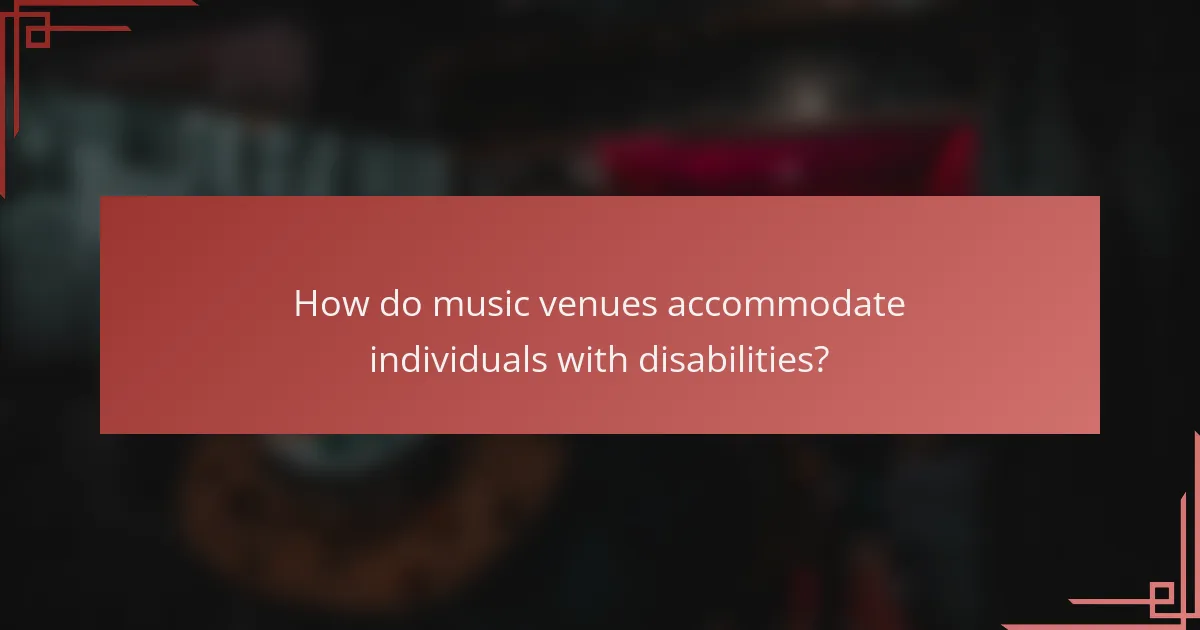
How do music venues accommodate individuals with disabilities?
Music venues accommodate individuals with disabilities through various facilities, services, and support systems designed to enhance accessibility. These measures ensure that everyone can enjoy performances regardless of their physical limitations.
Staff training on accessibility needs
Staff training on accessibility needs is crucial for creating an inclusive environment at music venues. Employees should receive training on how to assist individuals with various disabilities, including mobility impairments, hearing loss, and visual impairments.
Training programs often include practical scenarios and role-playing to help staff understand the challenges faced by disabled patrons. This prepares them to provide effective assistance, ensuring a positive experience for all attendees.
Dedicated accessibility coordinators
Having dedicated accessibility coordinators at music venues helps streamline the process of accommodating individuals with disabilities. These coordinators are responsible for overseeing accessibility initiatives, ensuring compliance with regulations, and serving as a point of contact for patrons seeking assistance.
Accessibility coordinators can facilitate special requests, manage seating arrangements, and coordinate with local disability organizations to enhance support services. Their presence ensures that accessibility is prioritized in every aspect of event planning.
Pre-event accessibility information
Providing pre-event accessibility information is essential for individuals with disabilities to plan their visit effectively. Venues should offer detailed information on accessible entrances, seating options, restrooms, and available services on their websites and promotional materials.
Clear communication about accessibility features allows patrons to make informed decisions. Venues can also include contact information for accessibility coordinators, enabling individuals to ask specific questions or request accommodations in advance.
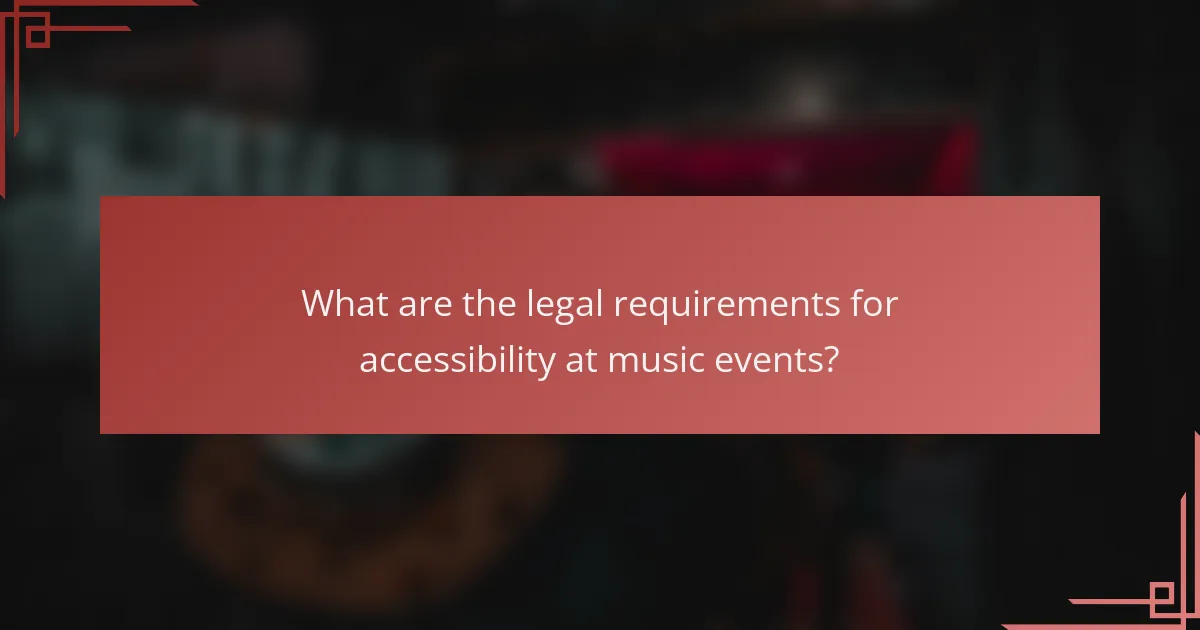
What are the legal requirements for accessibility at music events?
Legal requirements for accessibility at music events ensure that venues accommodate individuals with disabilities. These regulations typically mandate physical access, communication access, and services that support participation for all attendees.
Compliance with the Equality Act 2010
The Equality Act 2010 requires that all public events, including music festivals and concerts, be accessible to individuals with disabilities. This includes providing adequate facilities such as ramps, accessible seating, and accessible restrooms.
Event organizers must also ensure that information about accessibility options is clearly communicated to attendees. This may involve offering alternative formats for promotional materials and ensuring that staff are trained to assist individuals with disabilities effectively.
Local authority regulations
Local authorities may impose additional regulations that complement national laws regarding accessibility at music events. These can include specific requirements for the design of venues, emergency evacuation procedures, and the provision of services like sign language interpreters.
Event planners should consult with local authorities to understand the specific accessibility standards that apply in their area. This may involve submitting plans for approval that demonstrate compliance with both local and national accessibility requirements.
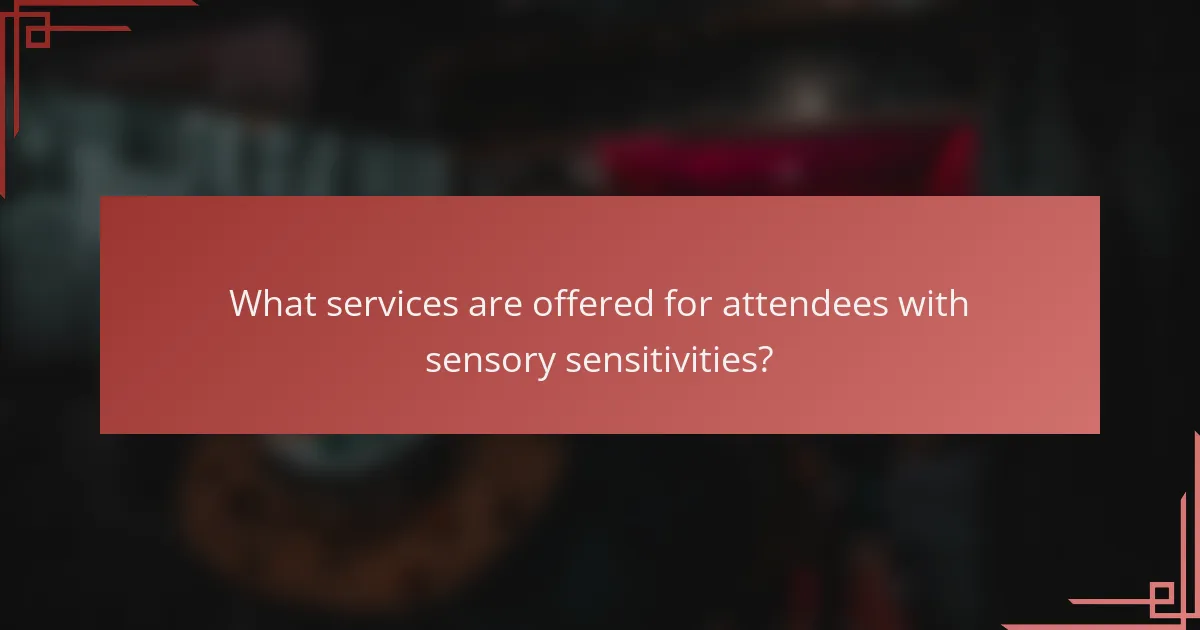
What services are offered for attendees with sensory sensitivities?
Attendees with sensory sensitivities can access various services designed to create a more comfortable experience at traditional music events. These services often include designated quiet areas and sensory bags that help manage overwhelming stimuli.
Quiet areas within venues
Quiet areas are specially designated spaces within music venues where attendees can retreat to minimize sensory overload. These areas are typically away from the main performance space and are designed to be calm and relaxing, often featuring soft lighting and comfortable seating.
When attending an event, look for signs indicating quiet zones or ask venue staff for directions. These spaces are crucial for individuals who may need a break from loud sounds or large crowds, allowing them to recharge before returning to the event.
Sensory bags for attendees
Sensory bags are kits provided to attendees that contain items designed to help manage sensory sensitivities. Common contents include noise-canceling headphones, fidget toys, and weighted blankets, all aimed at providing comfort and reducing anxiety during performances.
Many venues offer these bags for free or for a nominal fee, and they can often be reserved in advance. If you’re planning to attend an event, check the venue’s website or contact them directly to inquire about the availability of sensory bags and how to obtain one.
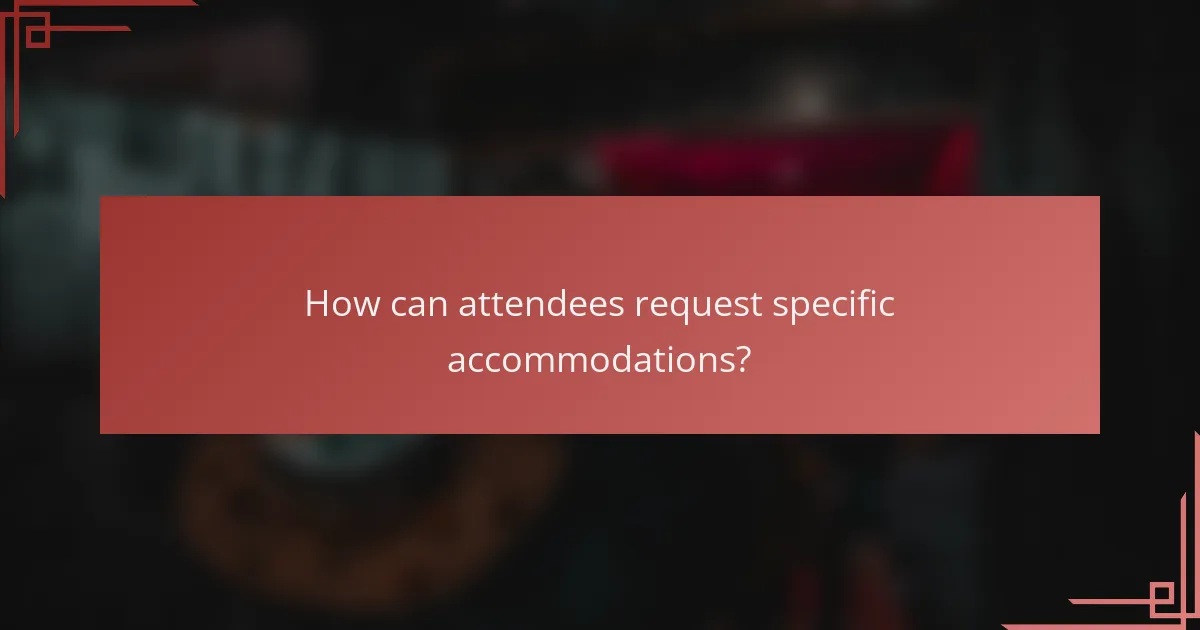
How can attendees request specific accommodations?
Attendees can request specific accommodations by directly contacting the venue or utilizing online request forms. It is essential to communicate needs well in advance to ensure that the necessary arrangements can be made for a comfortable experience.
Contacting venue customer service
Reaching out to the venue’s customer service is a straightforward way to request accommodations. Attendees should find the contact number or email address on the venue’s official website. When contacting them, clearly state your needs and any specific requirements you may have.
It is advisable to make these requests as early as possible, ideally several weeks before the event. This allows the venue sufficient time to prepare and ensures that your needs can be met without issues.
Using online request forms
Many venues offer online request forms for accommodations, which can streamline the process. These forms typically ask for details about the type of assistance needed, such as wheelchair access or sign language interpretation. Completing the form accurately helps the venue understand and fulfill your requirements.
Check the venue’s website for the availability of these forms and any deadlines for submission. Submitting requests through online forms can often be quicker than phone calls, but ensure to follow up if you do not receive confirmation of your request.
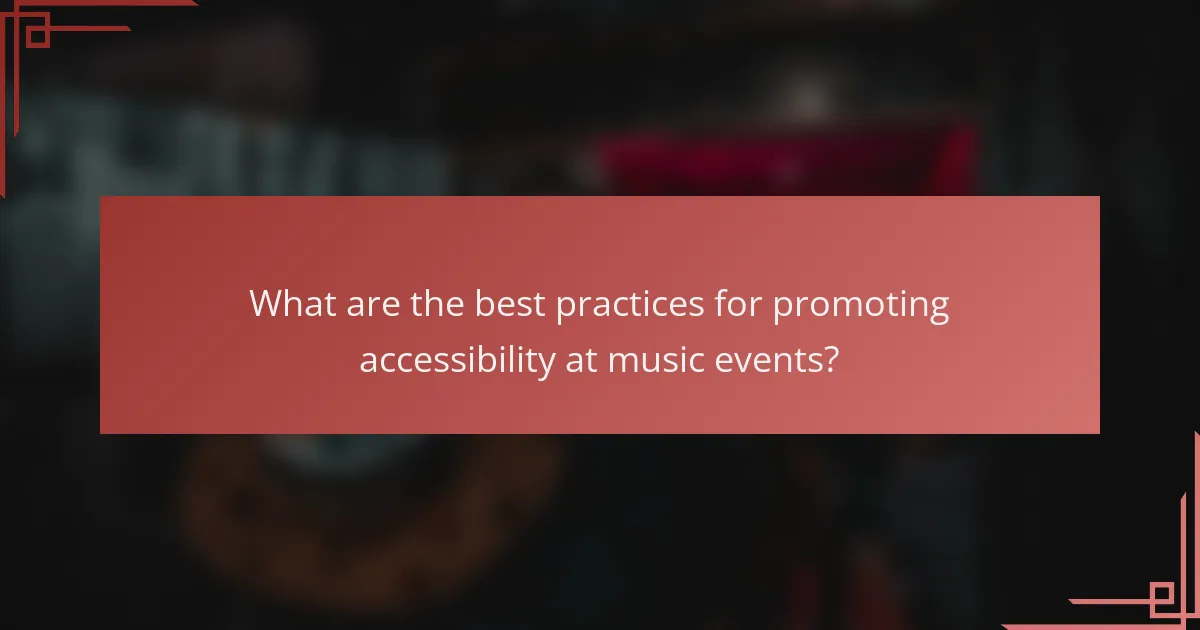
What are the best practices for promoting accessibility at music events?
Promoting accessibility at music events involves implementing strategies that ensure all attendees can enjoy the experience. This includes providing adequate facilities, services, and support tailored to the needs of individuals with disabilities.
Facilities for Accessibility
Accessible facilities are crucial for accommodating attendees with disabilities. This includes wheelchair-accessible entrances, restrooms, and seating areas. Venues should ensure that pathways are clear and that there are designated spaces for individuals who require assistance.
Additionally, providing sensory-friendly areas can enhance the experience for those with sensory sensitivities. These spaces should be quiet and comfortable, allowing attendees to take a break from the main event if needed.
Services to Support Accessibility
Offering services such as sign language interpreters and assistive listening devices can significantly improve accessibility at music events. Event organizers should consider hiring trained professionals who can facilitate communication for attendees with hearing impairments.
Moreover, providing information in multiple formats, such as braille or large print, is essential for individuals with visual impairments. Clear signage throughout the venue can also help guide attendees to accessible facilities.
Support for Attendees
Effective support for attendees with disabilities begins with clear communication about available accommodations. Event organizers should promote accessibility options through marketing materials and on event websites, ensuring that attendees know what to expect.
It is also beneficial to have trained staff on-site who can assist individuals with disabilities. Staff should be knowledgeable about the venue’s accessibility features and ready to provide help as needed, creating a welcoming environment for all attendees.
